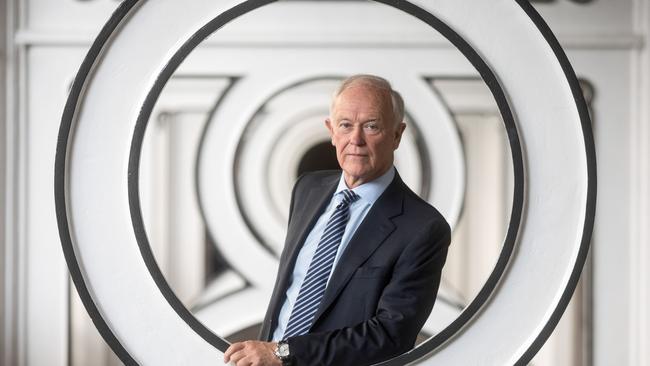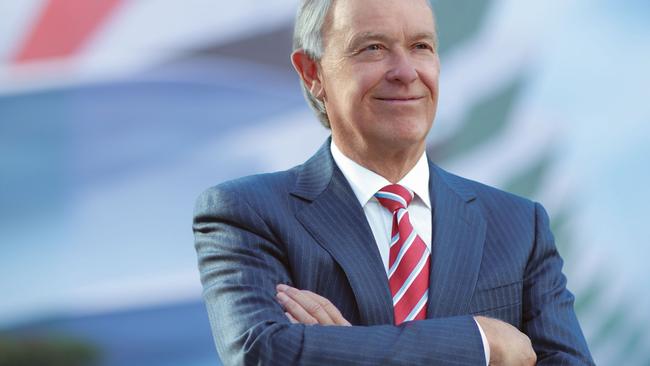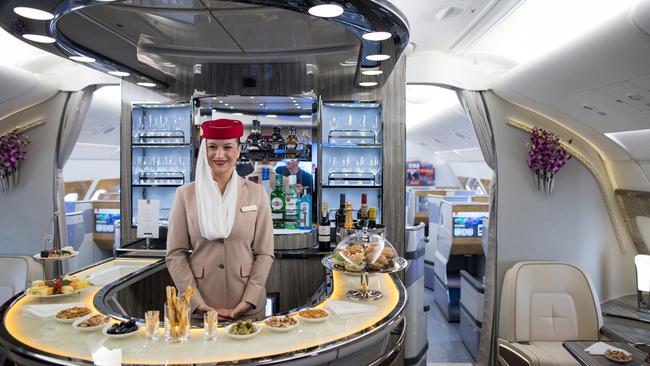Clock ticks down on A380s prompting warnings of an airline seat shortage when they go
The world’s biggest operator of A380s says it’s frustrating no new superjumbos are planned to replace its ageing fleet of ‘beasts’, despite huge demand.

The biggest operator of A380s, Emirates, has warned of a looming seat shortage when the airline’s 120 superjumbos are retired in ten years time, in the absence of a comparable alternative
Speaking on the sidelines of the International Air Transport Association summit in Istanbul, Emirates president Sir Tim Clark said they expected to see off the double decker aircraft in 2032-33 around the same time as Qantas planned to retire its A380s.
Although Emirates has scores of other widebody aircraft on order including A350s and Boeing 777-9s Sir Tim said none would match up to the A380 in terms of size and capacity.
“I have six A380s going into Heathrow with a 95 per cent seat factor. I shudder to think what’s going to happen if Heathrow doesn’t grow,” he said.
“If you take the 380 out of the mix and the next one down is a 777 which is 200-seats lighter, the demand is going to be severely suppressed and prices will rise.”
Repeated calls for manufacturers to develop a more environmentally friendly A380 had so far been ignored by Airbus and Boeing, much to Sir Tim’s frustration.
“What they’re down to is the 777 which we pushed, and the A350-1000. Really, is that it?” said Sir Tim.
“I’ve said to them what are your strategies for travel demand between now and 2040 because the bad news is it’s going to grow. Do the maths and then fit the capacity with all these big beasts out of the mix.”

Production of A380s was halted in 2021, due to insufficient orders for the giant birds. The milestone coincided with the Covid-19 pandemic triggering speculation the superjumbos might never fly again.
When restrictions eased and demand for travel exploded, airlines could not return the double decker planes to service fast enough, with Emirates still sweating on the return of about 16 A380s.
More than a year on, demand was still going through the roof with Sir Tim revealing
Emirates was solidly booked for the next nine months.
He said over December, they could have sold the same seat five times over.
Premium cabins were particularly popular with IATA reporting first and business class now carried 8 per cent of passengers, up from 7.6 per cent pre-Covid.
Unlike rival Qatar Airways, which was not bothering with first class anymore, Emirates remained committed to the most luxurious form of air travel with floor to ceiling private suites.

“85 per cent of our fleet have first class, in fact we have 30 per cent of total first class inventory in the world today,” said Sir Tim.
“It’s very successful for us. I came up from Dubai (to Istanbul) and there wasn’t a seat left in first class. I was the only non-revenue passenger. It remains hugely important to us.”
While demand remained strong, airfares were unlikely to fall significantly before climbing again as airlines increased investment in sustainability.
Any reduction in capacity would also put upward pressure on fares, that appeared destined never to return to 2019 levels.
IATA director general Willie Walsh said airlines — and travellers — would have some breathing space before the costs of buying more expensive biofuel “came at them”.
“If you’re looking at a five, ten, 15-year period, then I firmly believe we are going to have to see higher airfares as airlines cover the cost of the transition to net zero,” said Mr Walsh.
The writer was a guest of IATA in Istanbul.




To join the conversation, please log in. Don't have an account? Register
Join the conversation, you are commenting as Logout